- Babylon (13:1-14:23)
- Assyria (14:24-27)
- Philistines (14:28-32)
- Moab (15-16)
- Syria and Israel (17)
- Ethiopia (18)
- Egypt (19)
- Egypt and Cush (20)
- Babylon (21:1-10)
- Edom (21:11-12)
- Arabia (21:13-17)
- Jerusalem (22)
- Tyre (23)
This section mainly involves reading all the chapters, but contains few discussion questions.
Prophecy against Babylon (13:1-14:23)
The first prophecy in this series is against Babylon. In Isaiah's day, Babylon was a regional Mesopotamian power that occasionally rebelled against its Assyrian overlords, but provided no threat to Judah. During Isaiah's time, we see little of Babylon, except that emissaries from Babylon visit Hezekiah, trying to get him to side with them against Assyria (39:1-8).
But Isaiah's prophecy here speaks of a time two hundred years later when Babylon rises as a world power, sends her armies abroad, and begins a series of attacks on Judah, deporting its people and kings from 604 to 587 BC. Finally, in 587 BC, the Babylonians utterly destroy Jerusalem and carry off the treasures of the temple and palace to Babylon (2 Kings 25; Jeremiah 52).The people of Judah live in exile until 539 BC, when the Babylonians are conquered by the Medes and the Persians (Daniel 5:28) -- just as this prophecy predicts!
The Medes were from a region southwest of the Caspian Sea with its capital in Ecbatana. In 550 BC, the Medes had been conquered by Cyrus the Great, King of Persia (559-530 BC), who merged the Kingdom of the Medes into his own (known to historians as the Achaemenid or First Persian Empire, 550-330 BC). Isaiah's prophecy speaks of the time in 539 BC when Babylon falls to the Medes, who were vassals of Cyrus.
"See, I will stir up against them the Medes,
who do not care for silver and have no delight in gold....
Babylon, the jewel of kingdoms,
the glory of the Babylonians'pride,
will be overthrown by God like Sodom and Gomorrah." (Isaiah 13:17, 19)
Why would God give the prophet Isaiah a prophecy about a nation of minor significance to the Judah of his time? Because God knew that later, Babylon would play a major role in Judah's history, and this was to be an encouragement. God can speak through the prophets of events hundreds of years in the future. The prophecy in chapter 13 is one clear example.
In chapter 14, Isaiah prophesies a return from exile.
"The LORD will have compassion on Jacob;
once again he will choose Israel
and will settle them in their own land." (14:1a)
Does the Morning Star or Lucifer Represent Satan? (14:4-21)
In chapter 14 we find a taunt against Babylon's arrogant king.
"3 On the day the LORD gives you relief from suffering
and turmoil and cruel bondage,
4 you will take up this taunt against the king of Babylon:
How the oppressor has come to an end!
How his fury has ended!" (14: 3-4)
Not only the peoples, but the underworld, too, rejoices when it realizes that the king of Babylon, that great oppressor, is finally among them (14:9-11).
The prophet speaks in poetic terms of the king's arrogant exaltation, then his sudden fall from power, and finally his death. The morning or dawn star (which we know is actually a planet) would shine at dawn, brighter than all the stars in the heaven. Thus, the king of Babylon is being described as more powerful than all the kings in the world.
"12 How you have fallen from heaven,
O morning star,[101] son of the dawn!
You have been cast down to the earth,
you who once laid low the nations!
13 You said in your heart, 'I will ascend to heaven;
I will raise my throne above the stars of God;
I will sit enthroned on the mount of assembly,
on the utmost heights of the sacred mountain.[102]
14 I will ascend above the tops of the clouds;
I will make myself like the Most High.'
15 But you are brought down to the grave (Hebrew, Sheol)
to the depths of the pit.
16 Those who see you stare at you,
they ponder your fate:
'Is this the man who shook the earth and made kingdoms tremble,
17 the man who made the world a desert,
who overthrew its cities and would not let his captives go home?'" (14:12-17)
To "fall from heaven" is a poetic expression to describe falling from a great political height.[103] To us it might seem that exalting oneself to the position of God would require this king to be a supernatural being. But Isaiah seems to be using the terminology of pagan mythology to accentuate the magnitude of this pagan king's fall. R. Laird Harris comments:
"It is natural for a heathen king to boast that he would exalt his throne above the gods or above the mountain where he believed the gods assembled."[104]
Isaiah seems to be speaking figuratively. But some see in this taunt a representation of Satan's rebellion against God and fall from heaven. The argument for this interpretation, however, is rather weak. The KJV translates "morning star" (NIV) or "day star" (NRSV) as "Lucifer," a term from the Latin Vulgate meaning "light bearer." Following interpretations common in branches of Judaism in the first century BC, some early Christian commentators, such as Tertullian and Gregory the Great, saw in this passage a reference to the fall of Satan mentioned by Jesus: "I saw Satan fall like lightning from heaven" (Luke 10:18). This was picked up as a name for Satan in Dante's Inferno (fourteenth century) and John Milton's Paradise Lost (1667), and thus came into modern parlance as a synonym for Satan or the devil. But a direct connection between Isaiah 14 and Satan's fall is weak.[105]
It is true that the king of Babylon's pride and arrogance towards God were his downfall. Pride also characterized the king of Tyre in Ezekiel's prophecy (Ezekiel 28:12-19). And this arrogance is characteristic of Satan and the Antichrist (2 Thessalonians 2:4; Revelation 13). But to say that the king of Babylon and the king of Tyre are intended to be types to instruct us about Satan, goes far beyond the text. We must be careful not to over-interpret this passage.
Q1. (Isaiah 14) What was the attitude of heart in the ruler described in Isaiah 14:12-17? What is the scriptural evidence that this indeed refers to Satan? Have you ever exalted your opinion and will over God's will and God's word? How does this differ from the ruler in 14:12-17? What is the best way to humble oneself before the Lord?
https://www.joyfulheart.com/forums/index.php?showtopic=1266
Prophecy against Assyria (14:24-27)
Next is a prophecy of Assyria's downfall, foretold years before Sennacherib had brought Assyria's armies into Judah. God is saying that God will break Assyria's power, just as he will break Babylon's power centuries later.
Prophecy against the Philistines (14:28-32)
The prophecy against the Philistines came the year Ahaz died in 727 or 716 BC.[106] The broken rod (14:29) may refer to Ahaz's death or perhaps to the death of an Assyrian ruler -- we're not sure. Whatever the exact references, however, the point is that the Philistine expectation of freedom from their Assyrian oppressors won't be realized, and any alliance Judah might make with them is ill advised.
Prophecy against Moab (15-16)
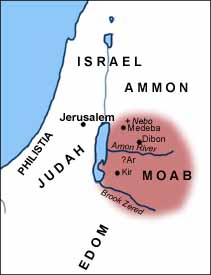 Chapters 15 and 16 give an anguished description of the destruction of Moab, which Isaiah prophesies will take place within three years (16:13-14). We're not sure of the exact date of fulfillment. We do know, however, that Moab suffered under Sargon's armies in 715 and 711 BC, and under Sennacherib in 701 BC. Some of the refugees from Moab will be welcomed by Judah (16:1-4a), so one of the earlier dates is more likely. The prophecy also contains a short glimpse at the coming righteous reign of the Messiah:
Chapters 15 and 16 give an anguished description of the destruction of Moab, which Isaiah prophesies will take place within three years (16:13-14). We're not sure of the exact date of fulfillment. We do know, however, that Moab suffered under Sargon's armies in 715 and 711 BC, and under Sennacherib in 701 BC. Some of the refugees from Moab will be welcomed by Judah (16:1-4a), so one of the earlier dates is more likely. The prophecy also contains a short glimpse at the coming righteous reign of the Messiah:
"In love a throne will be established;
in faithfulness a man will sit on it
-- one from the house of David --
one who in judging seeks justice
and speeds the cause of righteousness." (16:5)
Prophecy against Syria and Israel (17)
The next prophecy comes from a time when Syria and Israel were in league with each other. It concerns the destruction of Syria (Aram). Isaiah prophesies that Syria's capital city of Damascus will be destroyed (17:1), a prophecy which was fulfilled in 732 BC when Assyrian troops destroyed the city (2 Kings 16:9).
Syria's ally, the northern kingdom of Israel, will also witness devastated cities, though a few people will remain. Only then will they turn away from their pagan worship.
"In that day men will look to their Maker
and turn their eyes to the Holy One of Israel." (17:7)
Verses 10 and 11 remind me of our present godless situation:
"10 You have forgotten God your Savior;
you have not remembered the Rock, your fortress.
Therefore, though you set out the finest plants
and plant imported vines,
11 though on the day you set them out,
you make them grow,
and on the morning when you plant them,
you bring them to bud,
yet the harvest will be as nothing
in the day of disease and incurable pain." (17:10-11)
Many once-Christian nations seem to be moving away from God and towards secularism. As a result, despite their best efforts at cultivating prosperity, in the end the yield will be only emptiness and pain. "Blessed is the nation who God is the Lord" (Psalm 33:12).
Prophecy against Ethiopia (18)
The next oracle concerns Ethiopia or Cush (are also known as upper Egypt, Nubia, and present-day Sudan), a country characterized by buzzing insects, the Blue and White Nile Rivers dividing their land, and papyrus boats that ply the inland waterways. Apparently, the Ethiopians are sending emissaries to negotiate peace with the Assyrian enemy, but it is unnecessary; God will deal with the Assyrian threat: "He will cut off the shoots with pruning knives" (18:5). Ultimately, Ethiopia will worship God -- fulfilled, at least in part, by the conversion of the Ethiopian eunuch (Acts 8:26-39), who brought Christianity to his land, laying the foundations of the present-day Coptic Church.
Prophecy about Egypt (19)
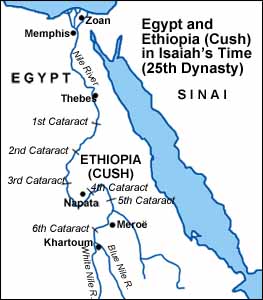 This prophecy concerns God's judgment against Egypt's idolatry. There will be civil war (19:2) and oppression (19:4). A serious drought that will severely diminish the flow of the Nile, throwing Egypt's economy into chaos (19:5-10), and the counselors to Egypt's rulers will offer only foolish counsel (19:11-15).
This prophecy concerns God's judgment against Egypt's idolatry. There will be civil war (19:2) and oppression (19:4). A serious drought that will severely diminish the flow of the Nile, throwing Egypt's economy into chaos (19:5-10), and the counselors to Egypt's rulers will offer only foolish counsel (19:11-15).
However, in the future Judah will grow in power relative to Egypt (19:16-18), and Egyptians will turn to the Lord (19:19-22). Finally, no doubt in the time of the Messiah, Egypt, Assyria, and Israel will be united by worship of Yahweh and an inter-connecting highway (19:23-25). Sovereign God, may this prophecy be soon fulfilled in its entirety!
Acted Prophecy against Egypt and Ethiopia (20)
This acted prophecy, given about 711 BC, was designed to keep Judah from aligning itself with Egypt against Assyria. For once, it appears that Isaiah's word is heeded. Egypt is eventually attacked by Assyria and prisoners of war deported to Mesopotamia, but Judah is spared.
When this prophecy is given, the northern kingdom of Israel had already fallen to Assyrian armies in 722 BC, its leaders deported, and its land settled by captives from other conquered lands (2 Kings 17:5-6).
Egypt, trying to assert its power, has been encouraging the Philistine cities along the coast to rebel against Assyria, with promises to bring military aid if Assyria attacks. In 713 BC, the fortified Philistine city of Ashdod does indeed rebel, and two years later Assyria, under Sargon II (722-705 BC), responds and replaces Ashdod's king with a puppet king.[107]
"In the year that the supreme commander, sent by Sargon king of Assyria, came to Ashdod and attacked and captured it...." (20:1)
The rebellion continues, with Egypt trying to get Judah, Edom, and Moab to join in the rebellion. The Lord sends Isaiah with a somewhat bizarre command -- to strip down for three years as an acted prophecy.
"2 At that time the LORD spoke through Isaiah son of Amoz. He said to him, 'Take off the sackcloth from your body and the sandals from your feet.'And he did so, going around stripped and barefoot. 3 Then the LORD said, 'Just as my servant Isaiah has gone stripped and barefoot for three years, as a sign and portent against Egypt and Cush, 4 so the king of Assyria will lead away stripped and barefoot the Egyptian captives and Cushite exiles, young and old, with buttocks bared -- to Egypt's shame.'" (20:2-4)
In other words, Isaiah's nakedness is to be a constant reminder to Judah not to rely on Egypt, that Assyria will attack Egypt and carry off captives, who were often stripped just as Isaiah was. And that's just what happened.
Sargon II sent his representative to put down the rebellion, and made Ashdod an Assyrian province, which was now ruled from Nineveh rather than by its own king. Egypt reneged on its promises of military aid. Apparently, Judah's king Hezekiah did not join the rebellion, since Judah suffered no reprisals in 711 BC.
The rebellious king of Ashdod had fled to Egypt. At this time, Egypt was ruled by the 25th Dynasty (about 760-656 BC), often referred to as the Ethiopian or Nubian Dynasty -- hence the inclusion of Cush (Ethiopia) with Egypt in this passage. The fortified city of Ashdod was the doorway to invading Egypt using the coastal route. When Assyria destroyed Ashdod, Egypt had to capitulate, and -- among other things -- Egypt was forced to give up the rebellious king of Ashdod. It is at this point that Isaiah's prophecy was fulfilled. In the Battle of Eltekeh in 701 BC, the army of Assyrian king Sennacherib (705-681 BC) met Egyptian forces, which were defeated and Judah would see streams of naked prisoners of war from Egypt/Ethiopia heading north to be resettled in other lands by the Assyrian victors.
This confirmed Isaiah's message -- Egypt cannot be relied on for help. But by this time Judah had joined in the rebellion against Assyria and has suffered an invasion by Assyria that conquered all her fortified cities except Jerusalem itself.[108]
Q2. (Isaiah 20) Why did God command Isaiah to go naked for three years? What was its meaning? What effect did this acted prophecy have on Judah's foreign policy? If you were Isaiah, would you have obeyed God?
https://www.joyfulheart.com/forums/index.php?showtopic=1267
Prophecy against Babylon (21:1-10)
Chapters 21-23 contain more somber prophecies than the previous series (chapters 13-20), which were more optimistic. The prophecies in chapters 21 to 23 tend to see mainly doom and darkness.
In Isaiah's day, Babylon was not the dominant world power that it would become a hundred years later when it conquered Judah. In Isaiah's day it was only a regional power. It had been conquered by Assyria, but now and then rebel against Assyria, requiring Assyria's troops to return and put down yet another rebellion.
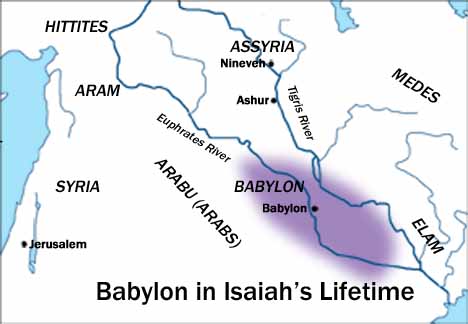
This prophecy may date to a period about 703 BC when envoys from Merodach-Baladan, king of Babylon (722-710 and 703-702) are in Jerusalem trying to form an alliance with Judah against Assyria (Isaiah 39). In this prophecy, Isaiah is apparently warning Hezekiah that an alliance with Babylon is doomed, since Babylon herself is doomed.
Isaiah is looking ahead prophetically one hundred years to the period of Babylon's dominance, when it would destroy Jerusalem (587 BC) and take three waves of captives into exile (between 605 to 587 BC). Isaiah is frightened by what he sees, because it involves Judah being "crushed on the threshing floor" (21:10).
"My heart falters, fear makes me tremble;
the twilight I longed for has become a horror to me." (21:4)
Babylon will eventually fall itself to the Medes and the Persians:
"Babylon has fallen, has fallen!
All the images of its gods lie shattered on the ground!" (Isaiah 21:9)
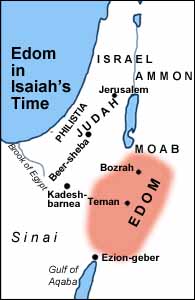 Prophecy against Edom (21:11-12)
Prophecy against Edom (21:11-12)
This very short prophecy concerns Edom, sometimes called Seir or Mount Seir. Perhaps an envoy from Edom has come to Isaiah asking about the future. The oracle concerns dumah, "silence" -- and also a play on words with "Edom." The prophet, the "watchman" is asked how long until morning? How long until the Assyrian oppression will be over? Isaiah's answer is essentially silence, no answer: "Morning is coming, but also the night" (21:12). Hope is coming, but not before a continued time of oppression.
Prophecy against Arabia (21:13-17)
Next is a brief prophecy concerning Arabia. Dedan is an Arabic people fleeing from war, who are camping or hiding in the thickets or scrub, off the beaten track. Tema, another north Arabic tribe,� is told to bring them water. Kedar is a generic term for the entire Arabian area and its various tribes. Within one year, prophesies Isaiah, the proud Arabs (Kedar) will be nearly destroyed. We don't know the exact date of the prophecy, but it is probably prior to 715 BC, when Sargon campaigned against tribes from Tema to the Gulf of Aqaba -- or perhaps prior to 703 BC, when the Arabs joined Merodach-Baladan of Babylon in rebellion and were defeated by Sennacherib.
Prophecy about Jerusalem (22)
The occasion this prophecy describes is somewhat obscure, but since it includes mention of names of officers during the siege of Jerusalem under Sennacherib (2 Kings 19:35-36, 701 BC), that seems to be the most likely context.[109] Isaiah's title, "The Valley of Vision" (20:1, 5), seems to be sarcastic, since Jerusalem, the focus of this prophecy, doesn't possess vision, but blunders on in its spiritual blindness. Its leaders can't see destruction looming. They can't see that God is a better defense than any they can construct. And their leaders lack both courage and responsibility. They're no better than the Gentiles, so this oracle belongs alongside prophesies of God's judgment on all the nations -- including God's people. Usually Jerusalem is referred to as "Mount Zion" -- a hilltop from which they see a broad view -- but here they're called "the Valley of Vision," because they can see nothing.
We're not sure of the historical context of this prophecy, but the cause of celebration may be deliverance from Sennacherib's attack on Jerusalem in 701 BC, though that explanation doesn't completely satisfy. Whatever the event, Isaiah questions the celebration and commotion on the rooftops (verses 1-2, 13) when they ought to be turning to God in repentance and faith.
They have prepared the defenses of Jerusalem (verses 8-11a; 2 Chronicles 32:5). Verse 22:11 probably refers to the construction of Hezekiah's tunnel that took water from the Gihon spring outside the walls to a pool inside the walls so that Jerusalem would continue to have a water supply even if besieged by an enemy (2 Kings 20:20; 2 Chronicles 32:2-4). The people made all these preparations, but did not seek the Lord or humble themselves before him (verses 11b-12). As Motyer puts it, "So delighted were they in their do-it-yourself security that a public holiday was declared (verse 13)."[110] They are trusting in their own security, rather than in Yahweh who made the city and loves it.
"You did not look to the One who made it,
or have regard for the One who planned it long ago." (22:11b)
They have trusted in their own works, rather than the grace of God, and so have committed the unforgiveable sin of unbelief (verse 14).
Now Isaiah turns to two individuals who are officers in Hezekiah's administration.[111] Shebna, Hezekiah's secretary, is referred to as "this steward," a derogatory term that might be translated "lackey."[112] This self-important man is preparing a fine tomb for himself on the heights of the city while Jerusalem itself is threatened. He is expendable (verses 15-19). Perhaps this is an example of corruption -- using the nation's resources to further one's own purposes and pride.
Whatever Shebna's exact sins, God is angry with his stewardship. Shebna will be replaced by another steward, says Isaiah, Eliakim son of Hilkiah, who will be responsible for the security of the palace of the descendants of David. Eliakim will act with honor and care for the people of Jerusalem (verses 20-24). His commission in verse 22 is even echoed in Revelation 3:7. Nevertheless, even the stability of his office will give way on the day of the Lord's judgment (verse 25), probably looking forward to the time when the final Davidic king was deposed by Babylon in 587 BC. The fall of the city is foretold in all of its pathos:
"The Lord, the LORD Almighty, has a day of tumult
and trampling and terror
in the Valley of Vision,
a day of battering down walls
and of crying out to the mountains." (22:5)
Q3. (Isaiah 22) Why is Judah faulted for making necessary military preparations in the face of the Assyrian armies? What should they have done at the same time (verses 11-12)? What seems to be the sin of Shebna, steward of the palace (verses 15-19)? Have you ever been guilty of selfishness instead of doing your duty to Christ?
https://www.joyfulheart.com/forums/index.php?showtopic=1268
Prophecy about Tyre (23)
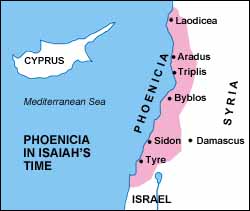 Tyre was the capital city of the Phoenician or Sidonian empire, a strongly fortified and wealthy city that traded with the chief port cities of the Mediterranean.
Tyre was the capital city of the Phoenician or Sidonian empire, a strongly fortified and wealthy city that traded with the chief port cities of the Mediterranean.
King Luli, officially "king of the Sidonians," controlled the coast as far south as Acco and had his capital at Tyre. He fled to Cyprus at the approach of the Assyrian troops in 701 BC.
Various trading partners are mentioned:
- Tarshish probably refers to Tartessus, a mining region in Spain, though the exact location is not known.[113]
- Cyprus was a Phoenician province, conquered by Sargon II in 709 BC.
- Sidon is the name of the kingdom ruled from Tyre and is a city on the coast north of Tyre.
- Shihor is apparently a branch of the Nile delta that brought grain to Tyre.
This prophecy foretells the defeat of Tyre at the hands of the Assyrians, probably fulfilled in 709 or 701 BC.
"The LORD Almighty planned it,
to bring low the pride of all glory
and to humble all who are renowned on the earth." (23:9)
The prophecy also foretells the rise of the Phoenicians 70 years later, perhaps about 630 BC when Assyria's power is weakened. In verse 17 this is described as a "return to her hire as a prostitute and will ply her trade with all the kingdoms on the face of the earth" (23:17), using terms similar to those that describe the fall of "Babylon" (Rome) in Revelation 17:2-5; 18:9-14; 19:2. Like prostitutes, everything is done for money. Finally, however, in a later renewal, Isaiah prophesies that Tyre's wealth will be set apart for the Lord (23:18).
We've quickly surveyed prophecies concerning both Jerusalem and surrounding nations. This isn't a very positive group of prophecies, but rebukes for arrogance and unwillingness to trust the Lord and humble oneself before him. Perhaps the primary lesson we should learn is that we are accountable to him. Even the rulers of nations need to seek the Lord for wisdom and justice as they govern and set foreign policy. Yahweh is Lord of all the nations -- and all of us.
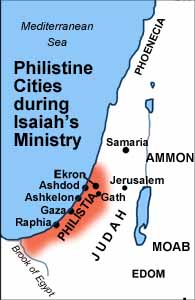
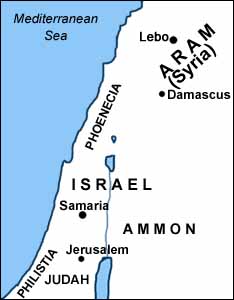
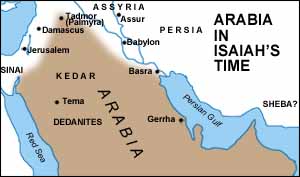

No comments:
Post a Comment